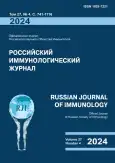Краткий обзор современных статей об этиопатогенезе и реабилитации пациентов с аллергическим ринитом
- Авторы: Игнатова И.А.1,2, Иваненко Д.Б.2
-
Учреждения:
- ФГБНУ «Федеральный исследовательский центр “Красноярский научный центр Сибирского отделения Российской академии наук”»
- ФГБОУ ВО «Красноярский государственный медицинский университет имени профессора В.Ф. Войно-Ясенецкого» Министерства здравоохранения РФ
- Выпуск: Том 27, № 4 (2024)
- Страницы: 925-928
- Раздел: КРАТКИЕ СООБЩЕНИЯ
- URL: https://bakhtiniada.ru/1028-7221/article/view/267905
- DOI: https://doi.org/10.46235/1028-7221-16937-ARA
- ID: 267905
Цитировать
Полный текст
Аннотация
В статье представлен краткий обзор современных источников литературы, касающихся распространенности, этиопатогенетических подходов в диагностике и лечении аллергических ринитов.
Актуальность рассматриваемой проблемы обусловлена высокой распространенностью данной патологии, многообразием этиопатогенетических механизмов и вариабельностью классификаций. Одной из наиболее востребованных классификаций является сезонная.
При изучении патогенетических механизмов выявлены следующие закономерности: слизистая оболочка носа является основным кондиционером дыхательных путей и первой линией защиты от инфекционных агентов, передающихся воздушно-капельным путем. Для этих ролей необходимы поддержание и восстановление целостности эпителия и способности инициировать иммунные ответы. При наличии условий или факторов, которые нарушают целостность слизистой оболочки, эпителий высвобождает алармины и другие молекулярные структуры, связанные с повреждением, которые запускают механизмы восстановления, но также могут вызывать защитное воспаление. При аллергическом рините те же механизмы могут активизировать развитие заболевания.
Многие авторы рассматривают различные диагностические методы аллергического ринита, такие как подробный и грамотный сбор жалоб и анамнеза, в том числе семейного; физикальный осмотр, эндоскопическое исследование полости носа, риноманометрия, кожные прик-тесты, радиологические исследования, в том числе компьютерная томография придаточных пазух носа, внутрикожные пробы, исследование общих и специфических иммуноглобулинов Е в сыворотке крови, тест активации базофилов, назальный провокационный тест, назальная цитология и гистология биопсийного материала, акустическая ринометрия, исследование пикового потока назального вдоха, измерения оксида азота. Также внимание уделяется лабораторным и инструментальным методам для дифференциальной диагностики ринитов псевдоаллергического генеза, для этого применяются следующие методы: ультразвуковая диагностика гепатобиллиарной системы, биохимический анализ крови, иммунологические исследования.
Лечение больных аллергическим ринитом предполагает комплексный и междисциплинарный подход и, безусловно, требует дифференциальных и персонифицированных методов с учетом этиопатогенетических механизмов.
Ключевые слова
Полный текст
Открыть статью на сайте журналаОб авторах
И. А. Игнатова
ФГБНУ «Федеральный исследовательский центр “Красноярский научный центр Сибирского отделения Российской академии наук”»; ФГБОУ ВО «Красноярский государственный медицинский университет имени профессора В.Ф. Войно-Ясенецкого» Министерства здравоохранения РФ
Автор, ответственный за переписку.
Email: ignatovai@mail.ru
д.м.н., доцент ВАК, ведущий научный сотрудник лаборатории клинической патофизиологии Научно-исследовательского института медицинских проблем Севера – обособленное подразделение ФГБНУ «Федеральный исследовательский центр “Красноярский научный центр Сибирского отделения Российской академии наук”»; профессор кафедры оториноларингологии ФГБОУ ВО «Красноярский государственный медицинский университет имени профессора В.Ф. Войно-Ясенецкого» Министерства здравоохранения РФ
Россия, 660022, г. Красноярск, ул. Партизана Железняка, 3г; г. КрасноярскД. Б. Иваненко
ФГБОУ ВО «Красноярский государственный медицинский университет имени профессора В.Ф. Войно-Ясенецкого» Министерства здравоохранения РФ
Email: ignatovai@mail.ru
ординатор 1-го года обучения кафедры ЛОР-болезней
Россия, г. КрасноярскСписок литературы
- Дынева М.Е., Курбачева О.М. Аллергический ринит – актуальная проблема XXI века // Consilium Medicum, 2019. Т. 21, № 3. С. 65-68. [Dyneva M.E., Kurbacheva O.M. Allergic rhinitis – the actual problem of the XXI century. Consilium Medicum = Consilium Medicum, 2019, Vol. 21, no. 3, pp. 65-68. (In Russ.)]
- Игнатова И.А., Смирнова С.В., Манчук В.Т. Аллергическая риносинусопатия (истинного и псевдоаллергического генеза). СПб.: Диалог, 2007. 104 с. [Ignatova I.A., Smirnova S.V., Manchuk V.T. Allergic rhinosinusopathy (true and pseudoallergic origin)]. St. Petersburg: Dialog, 2007. 104 p.
- Ильина Н.И., Курбачева О.М., Павлова К.С., Польнер С.А. Федеральные клинические рекомендации: Аллергический ринит // РАЖ, 2017. № 2. С. 47-54. [Ilyina N.I., Kurbacheva O.M., Pavlova K.S., Polner S.A. Federal clinical guidelines. Allergicheskiy rinit. RAZh = Russian Journal of Allergy, 2017, no. 2, pp. 47-54. (In Russ.)]
- Лусс Л.В. Этиология, патогенез, проблемы диагностики и лечения аллергического ринита // РМЖ, 2003. Т. 11, № 12. С. 718-728. [Luss L.V. Etiology, pathogenesis, diagnostic problems and treatment of allergic rhinitis. RMZh = Russian Medical Journal, 2003, Vol. 11, no. 12, pp. 718-728. (In Russ.)]
- Свистушкин В.М., Никифорова Г.Н., Артамонова П.С., Шевчик Е.А. Современные возможности патогенетической терапии больных аллергическим ринитом // Медицинский совет, 2020. № 6. С. 101-106. [Svistushkin V.M., Nikiforova G.N., Artamonova P.S., Shevchik E.A. Modern possibilities of pathogenetic therapy of patients with allergic rhinitis. Meditsinskiy sovet = Medical Council, 2020, no. 6, pp. 101-106. (In Russ.)]
- Bernstein D.I., Schwartz G., Bernstein J.A. Allergic rhinitis: mechanisms and treatment. Immunol. Allergy Clin. North Am., 2016, Vol. 36, no. 2, pp. 261-278.
- Bousquet J., Anto J.M., Bachert C., Baiardini I., Bosnic-Anticevich S., Walter Canonica G., Melén E., Palomares O., Scadding G.K., Togias A, Toppila-Salmi S. Allergic rhinitis. Nat. Rev. Dis. Primers, 2020, Vol. 6, no. 1, 95. doi: 10.1038/s41572-020-00227-0.
- Czech E.J., Overholser A., Schultz P. Allergic rhinitis. Prim Care, 2023, Vol. 50, no. 2, pp. 159-178.
- Hoyte F.C.L., Nelson H.S. Recent advances in allergic rhinitis. F1000Res., 2018, Vol. 7, F1000 Faculty Rev-1333. doi: 10.12688/f1000research.15367.1.
- Meng Y., Wang C., Zhang L. Advances and novel developments in allergic rhinitis. Allergy, 2020, Vol. 75, no. 12, pp. 3069-3076.
- Moitra S., Mahesh P.A., Moitra S. Allergic rhinitis in India. Clin. Exp. Allergy, 2023, Vol. 53, no. 7, pp. 765-776.
- Okubo K., Kurono Y., Ichimura K., Enomoto T., Okamoto Y., Kawauchi H., Suzaki H., Fujieda S., Masuyama K.; Japanese Society of Allergology. Japanese guidelines for allergic rhinitis 2020. Allergol. Int., 2020, Vol. 69, no. 3, pp. 331-345.
- Schuler Iv.C.F., Montejo J.M. Allergic rhinitis in children and adolescents. Pediatr. Clin. North Am., 2019, Vol. 66, no. 5, pp. 981-993.
- Siddiqui Z.A., Walker A., Pirwani M.M., Tahiri M., Syed I. Allergic rhinitis: diagnosis and management. Br. J. Hosp. Med. (Lond.), 2022, Vol. 83, no. 2, pp. 1-9.
- Wise S.K., Damask C., Roland L.T., and others International consensus statement on allergy and rhinology: Allergic rhinitis – 2023. Int. Forum Allergy Rhinol., 2023, Vol. 13, no. 4, pp. 293-859.
Дополнительные файлы







